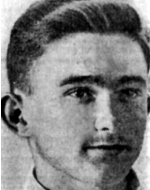Burstein, Menachem
Son of Monia and Avigdor-Aryeh, was born on July 22, 1930 in the city of Rovno, the Volhynia region, which was then part of Poland. From childhood he grew up in a Hebrew atmosphere in the home of his father, the teacher and his mother the teacher. In 1936 he immigrated with them to Israel and was educated in schools in various places of their educational work – at Ayelet Hashahar, Tel Yosef, Beit Alpha, Tel Adashim, the Jordan Valley joint school and later classes in Mishmar Ha’emek, Fat. As a child he liked to help with the herd of sheep and then with fruit trees. He was particularly interested in literature, history, and sociology. He was an amateur and a map collector, loved to wander the paths of the country, and on many walks he knew all its corners. In his notes on books he has read and in his notes on human, national and social problems in the world and in our world in general and in the youth society of his surroundings in particular, a comprehensive and profound understanding of the issues in question is expressed in a clear and convincing publication in its form and inner truth. He also gave a nice expression to the songs he began writing at the age of 14-15. He was active and active, with a will and energy to benefit and improve and organizational and orderly ability in the life of his group, both as one of the best instructors in the Hashomer Hatzair movement during his years in the following classes and as a post holder in his training nucleus in Negba. From his notes and friends’ stories, it emerges that he devoted himself to his tasks in all seriousness as an adult and responsible, and his attention was devoted to every detail of his nuclear life in order to raise the cultural level and ability of the individuals and the small collective. He was firm in his demands from his friends, and to the older members of the kibbutz and movement he knew how to meet the demands and needs of his party politely but firmly. At the beginning of 1948 he left with some of the nucleus for training in the flames of the Bashan, and there too the local people immediately stood up for his good qualities and liked him.After a short time the state came from Lake Saxons and the dangers and attacks from the area and the Syrian border crossed. He was one of the adults in guarding, defense and patrols, especially specializing in weapon handling and also completing a Palmach course. From his letters it seems that despite his preoccupation with various public matters, work and defense, he did not divert his attention and love from his parents and his little sister. Even in those difficult days, he continued to embroider the lines of his poetry and with all his might he clung to life and work, yet he took upon himself the obligation to sacrifice for them. He wrote in his poem “Vandals” (dedicated to Hannah Szenes): “Vandals were taken, unknown people will not return, and the Lev knows – no girl will laugh at us.” “In the future we will not know a day will come, in prayer and in the birah, we will sing for him, one day will come for him, for his sake, for his green fields.” And so, for the green fields of the next day, he passed, in June 1948, with the Palmach unit to which he belonged, to fight on the way to Jerusalem and there, on the 9th of Tammuz 5708 (9.7.1948), fell on one of the outposts. He was buried in Sheikh Bader Aleph. On the 28th of Elul 5710 (10.9.1950) he was put to rest at the military cemetery on Mount Herzl in Jerusalem. A booklet containing his notes and poems appeared in his memory by N. Twersky, Tel Aviv
